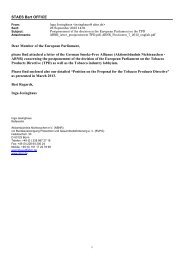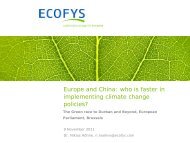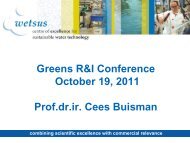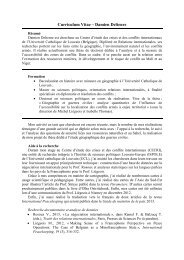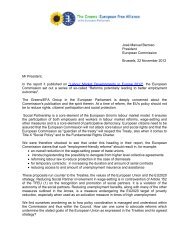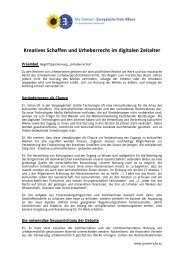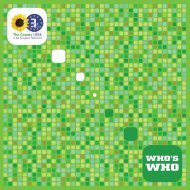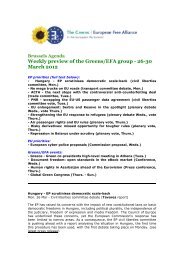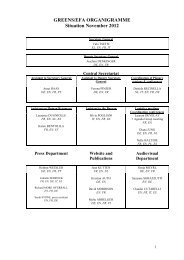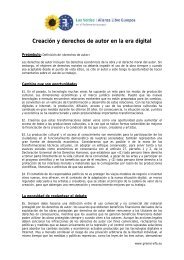Agro-Biotechnology: - The Greens | European Free Alliance
Agro-Biotechnology: - The Greens | European Free Alliance
Agro-Biotechnology: - The Greens | European Free Alliance
Create successful ePaper yourself
Turn your PDF publications into a flip-book with our unique Google optimized e-Paper software.
18 | Cloned farm animals - a ‚killing application‘? | Technical problems<br />
reprogramming in the germ line cell:<br />
“In sexually reproducing organisms, epigenetic variations have to survive the<br />
complex process of meiosis in order to be transmitted to the next generation,<br />
and, in multicellular organisms, they also have to survive gametogenesis<br />
and early embryogenesis – two developmental stages that involve significant<br />
restructuring of both cells and chromatin. (...) <strong>The</strong>re is evidence that chromatin<br />
marks and RNAs can be transmitted in this manner, but it is not clear how<br />
this occurs. It seems likely that some footprints of chromatin marks remain<br />
and lead to the reconstruction of ancestral states, or that some remnants of<br />
ancestral states (including some RNAs) are retained.”<br />
EFSA (2009) also acknowledges publications showing that RNA can be transmitted<br />
via semen to the next generation, which is one of the possible transfer<br />
mechanisms of epigenetic effects.<br />
Furthermore EFSA (2009) mentions heteroplasmy in mitochondria as being<br />
transferred to next generations. Here only a small number of animals was<br />
investigated.<br />
"It has been demonstrated that donor mitochondrial DNA (mtDNA) is transmitted<br />
to clone offspring with varying efficiencies (Takeda et al., 2008). Four<br />
cows (F1) with mtDNA heteroplasmy showed normal growth, productivity and<br />
lactation characteristics and productivity.“<br />
Given awareness that the mechanisms for epigenetic changes cause a high level<br />
of unpredictability, a substantial health risk to following generations cannot<br />
be ruled out. <strong>The</strong>re is a certain likelihood that some of the adverse epigenetic<br />
effects can escape restructuring during gametogenesis (becoming a cell in the<br />
germ line of the cloned animal 19 ). <strong>The</strong> gametogenesis which is decisive for sexual<br />
reproduction of the animals already starts during the growth of the embryo.<br />
So far there seems to be some lack of understanding of whether the adverse<br />
effects observed in embryos can also impact the genesis of the male or female<br />
germ cells (FDA, 2008). It is surprising that the FDA (2008) nevertheless firmly<br />
rules out any impacts on following generations.<br />
It is quite plausible that effects in offspring generations of cloned farm animals<br />
have hardly been observed so far due to the limited number of cases investigated.<br />
Furthermore, some adverse effects might only appear under certain<br />
environmental conditions such as stress or infectious diseases under conditions<br />
of commercial farming. As Edwards et al. (2003) who were not assessed by<br />
EFSA, explain, even seemingly healthy and normal clones might be affected by<br />
deficiencies:<br />
“However 'normal and healthy' cloned animals may appear, it is possible that<br />
undiagnosed pathologies may develop later in life as a result of subtle changes<br />
19 <strong>The</strong> cells in the germ line are those that ultimately become the sperm and egg.



